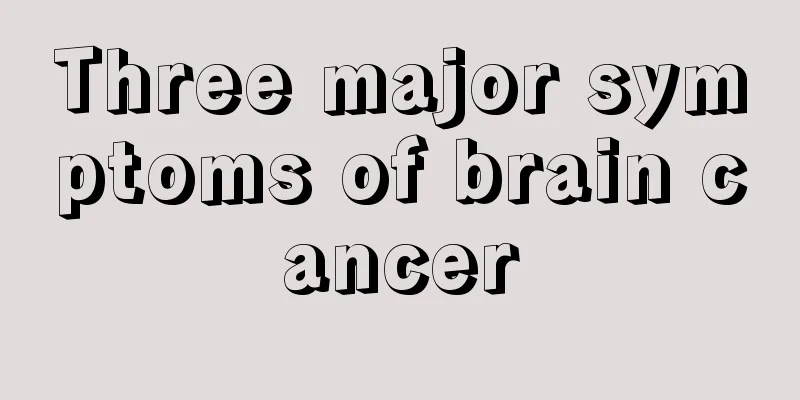Three major symptoms of brain cancer

|
Brain cancer, also known as intracranial tumors, can originate from the brain, meninges, nerves, blood vessels and brain appendages, or metastasize from other tissues or organs in the body and invade the brain. Most of them can cause headaches, intracranial hypertension and focal symptoms. So what symptoms will appear if you have brain cancer? Brain cancer symptom 1: visual impairment It is caused by increased intracranial pressure, which causes papilledema. Papilledema can be detected with an ophthalmoscope. Patients may experience decreased vision, blurred vision, diplopia, hemianopsia or blindness. Brain cancer symptom 2: vomiting Vomiting often occurs in the morning or when the headache is severe. The vomiting is jet-like, without nausea, and has nothing to do with diet. Compared with vomiting caused by gastrointestinal diseases, vomiting in patients with brain tumors is not accompanied by abdominal distension, nausea, abdominal pain, and diarrhea. Instead, "jet-like vomiting" suddenly occurs after a headache. Because the increased intracranial pressure stimulates the respiratory center of the medulla oblongata, this characteristic jet-like vomiting will occur. Some children with brain cancer, who cannot express other symptoms, often use unexplained jet-like vomiting as a criterion for the early stage of the disease. Brain cancer symptom three: headache Headache is the most common symptom of brain cancer. It often occurs intermittently in the early stage, and then develops into persistent and progressive pain. The nature of the pain may be throbbing dull pain, distending pain, compressive pain, or splitting pain. The location of the headache is mostly in the forehead, both temporal regions, or the occipital region. The location of the pain is not consistent with the location of the tumor. This type of headache often occurs at four or five in the morning, and often wakes you up from a deep sleep. The deeper you sleep, the more severe the pain. After getting up and moving around, the headache gradually eases and even disappears at eight or nine o'clock, so it is called a "morning headache", which is a major sign unique to brain tumors. The mechanism of this "morning headache" is that the brain tumor partially obstructs the normal circulation of cerebrospinal fluid, especially after a good night's sleep, forming transient hydrocephalus, causing severe headaches and waking up with pain. Getting up and moving around can speed up the circulation of cerebrospinal fluid, so the headache can be relieved. Through the above introduction, we know the three major symptoms of brain cancer. I believe everyone has a certain understanding of the symptoms of brain cancer. I hope this article can help you or your friends. This article is for reference only. If you have other questions, please consult our experts online. Brain cancer http://www..com.cn/zhongliu/na/ |
<<: What factors can cause brain cancer
>>: What are the symptoms of skin cancer
Recommend
What's the matter with the eyebrow bone pain and how to relieve it
Brow bone pain is relatively rare for many people...
How to remove sweat hair on hands
In addition to the sweat hair on our faces, we al...
How to remove tea stains from clothes
Tea stains on clothes are a very troublesome prob...
How to check if you have endometrial cancer
The cause of endometrial cancer is not very clear...
How to prevent rheumatic bone pain?
It is generally known that pain occurs when there...
Revealing four ways to get rid of snoring
When you and your significant other are resting, ...
How to remove acne marks and acne pits
Acne marks and acne pits are the signs of youth, ...
What's wrong with bad breath in advanced lung cancer?
What happens if you have bad breath in the late s...
Can regular running treat bile duct cancer?
Many patients will feel very tired after staying ...
Coffee plus exercise to prevent skin cancer? Let's do it
Skin cancer is one of the most common cancers in ...
How long can I live with shoulder pain due to lung cancer
There are many factors that lead to this situatio...
What foods are good for intestinal health?
The intestine is the largest immune organ and the...
What are the causes of hepatic ascites?
Many people don't know much about ascites. It...
How to take Danxin Drop Pills?
It is inevitable that people get sick in life, an...
How to diagnose primary liver cancer? Clinical diagnostic methods for primary liver cancer
Primary liver cancer is one of the more common ma...









